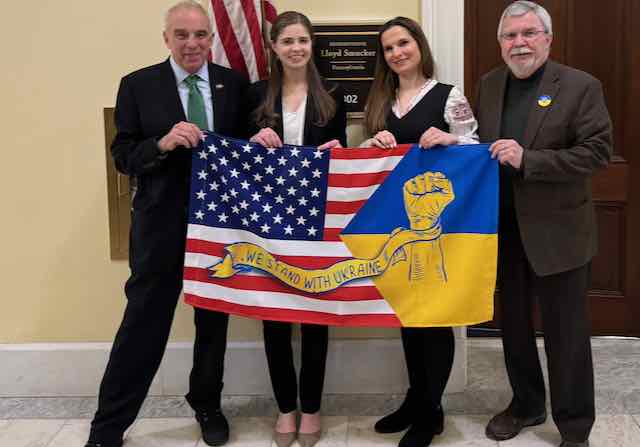On Saturday and Sunday this week, many of us will be in both Washington D.C. and Philadelphia at events marking the second anniversary of the Russian invasion.
Veteran of four wars, four enlistments, four branches: Air Force, Army, Army Reserve, Army National Guard. I am both an AF (Air Force) veteran and as Veteran AF (As Fuck)
Monday, February 19, 2024
President's Day Standing with Ukraine at the Pennsylvania State Capital
On Saturday and Sunday this week, many of us will be in both Washington D.C. and Philadelphia at events marking the second anniversary of the Russian invasion.
Tuesday, February 13, 2024
Tuesday, February 6, 2024
David Bentley Hart in 2011: "the devil is probably eerily similar to Donald Trump—though perhaps just a little nicer."
From 2003 to 2020, the Eastern Orthodox theologian David Bentley Hart wrote a column for First Things magazine.
In 2011, Hart ended one of his columns with a comment on Donald Trump. Hart continues to hold his low view of the former President. The essay ends with a 46-word sentence comparing The Donald to The Devil.
By the way, First Things magazine now leads the worship of Trump for conservative Catholics.
Here is Hart on Trump:
... Donald Trump... You know the fellow: developer, speculator, television personality, hotelier, political dilettante, conspiracy theorist, and grand croupier—the one with that canopy of hennaed hair jutting out over his eyes like a shelf of limestone.
In particular, I recalled how, back in 1993, when Trump decided he wanted to build special limousine parking lots around his Atlantic City casino and hotel, he had used all his influence to get the state of New Jersey to steal the home of an elderly widow named Vera Coking by declaring “eminent domain” over her property, as well as over a nearby pawn shop and a small family-run Italian restaurant.
She had declined to sell, having lived there for thirty-five years. Moreover, the state offered her only one-fourth what she had been offered for the same house some years before, and Trump could then buy it at a bargain rate. The affair involved the poor woman in an exhausting legal battle, which, happily, she won, with the assistance of the Institute for Justice.
How obvious it seems to me now. Cold, grasping, bleak, graceless, and dull; unctuous, sleek, pitiless, and crass; a pallid vulgarian floating through life on clouds of acrid cologne and trailed by a vanguard of fawning divorce lawyers, the devil is probably eerily similar to Donald Trump—though perhaps just a little nicer.
Tuesday, January 30, 2024
Six Easy Pieces by Richard P. Feynman
Reading Richard Feynman gives me the feeling that I can understand a little bit of the mystery and beauty of science. I thought I would read the short introductory paperback before deciding whether I should attempt the three-volume Feynman Lectures on Physics.
After reading QED: The Strange Theory of Light and Matter, I wanted to read more of Feynman and again have that feeling I could really comprehend modern physics. It is like riding in a strong tailwind on a bicycle. I am zipping along above 25mph and can think for a moment I am really that strong, at least until I turn into the wind and feel merely human again.
Feynman give me a science high.
In the first lecture, Atoms in Motion, he says,
Each piece, or part, of the whole of nature is is always merely an approximation to the complete truth, or the complete truth so far as we know it. In fact, everything we know is only some kind of approximation, because we know that we do not know all the laws as yet. Therefore, things must be learned only to be unlearned again, or, more likely, to be corrected.
On page 2, I know what science is. Two pages later the section titled Matter is made of atoms begins:
If in some cataclysm, all of the scientific knowledge were to be destroyed, and only one sentence passed on to the next generation of creature, what statement would contain the most information in the fewest words? I believe it is the atomic hypothesis (or the atomic fact whichever you wish to call it) that all things are made of atoms--little particles that move around in perpetual motion, attracting each other when they are a little distance apart, but repelling each other upon being squeezed into one another. In that one sentence, you will see, there is an enormous amount of information about the world, if just a little imagination and thinking are applied.
Entertaining and brilliant. The rest of the book bubbles with insights, elucidating basic physics, showing the connections of all the sciences to each other, then a chapter on energy in its many forms, followed by gravity--the weakest force, ending with quantum mechanics.
I am going to read another Feynman book this week.
Wednesday, January 24, 2024
How General Erwin Rommel Rationalized Supporting Hitler
I am reading a book about the careers of the of the most well-known generals of World War II. All of them were decorated young officers in World War I. They made the army their career, serving in diminished armies until the late 1930s when war put all three in command of great armies.
Rommel is known as the Desert Fox, really his worst performance as a commander, and for joining the failed plot to assassinate Hitler after in 1944. But he was for Hitler before he turned against him. His path to making peace with Hitler has chilling parallels with today.
From the book:
In 1932, the Nazi Party's achievement in becoming the largest party in the Reichstag was not greeted with concern by the Army Officer Corps, but with hope. Although I do not like their methods, wrote Oberst Karl Kuhn of the General Staff in his diary in November 1932, most of my acquaintances see developments as good for Germany and good for the army.
Most of the soldiers seemed to agree, although most seem more concerned with the implications for their pay and accommodation. The officer corps had reservations about the Nazi Party and its leadership, the tub-thumping rhetoric of Adolf Hitler feeding widespread distrust of the former First World War corporal, but many were willing to see what the Nazis could come up with to solve chronic German problems.
Berlin based Oberstleutnant Paul Uckleman wrote in his journal that he thought Hitler is no gentleman and described his colleagues as brutes, thugs, and men on the make, using vile tactics and supporting questionable policies. Nevertheless, Uckleman also wrote that perhaps Hitler is the man to destroy the Communists and help revive Germany and the army.
It was a view that seems to have reflected Erwin Rommel's own thinking about the Nazis. Hitler and his party were distasteful, but they were better than the alternatives in their offer of an enticing vision to end internal crises, bolster the economy and provide a muscular nationalism that would break the Versailles Treaty shackles reinvigorate the armed forces and redraw Germany's borders. As Rommel’s biographer Ralf Georg Reuth has argued, the most influential part of the army hoped that Hitler would become vanquisher of the discord that had traumatized German society since 1918.
Monday, January 22, 2024
The Purpose of Life? To Live--Yogi Sadhguru
Thursday, January 18, 2024
Supporting Ukraine on Capital Hill--Meeting Lawmakers
Yesterday, I joined members of the American Coalition for Ukraine to ask members of the Congress representing Pennsylvania to support the Ukraine in its war against Russian aggression. The group I was part of visited the offices of Congressman Lloyd Smucker, Senator Robert Casey, Senator John Fetterman, and Congressman Guy Reschenthaler.
Our message: Ukraine needs ammunition and missiles urgently.The response from each of the staffers we met with was support for Ukraine, but then came the various expressions of regret. The Republican congressmen face opposition within their own party. The phrase "in the current climate" summed up that regret saying in effect, We wish we could do more, but..."
Both of the senate staffers were in support of Ukraine and fighting against Republican opposition in both the Senate and the House. We heard Senator Fetterman is "extremely disappointed" with the "dysfunctional House of Representatives." He considers the abandonment of Ukraine support by Republicans "reprehensible" and "unAmerican."
When I was at the last Ukraine Action Summit October 22-24 of last year, the Fetterman visit was the best. He stood with us on the steps of the Senate and declared complete support for Ukraine. I wrote about that visit here. For those of us who spent six years protesting Senator Pat Toomey, the best result of our protest is that Toomey did not run for re-election and John Fetterman took his place in the senate.
Fetterman is just as strong on his support for Israel. The walls of his office are covered with posters of the hostages taken by HAMAS terrorists on October 7. Those released are on one side, those still held are on the other.
I have another Congressional visit tomorrow. I will write about that as soon as I can.
I believe Ukraine is the front line of the defense of freedom and democracy against Russia and her authoritarian allies in Iran, China, North Korea, Hungary, Turkey, and all of those within America who support tyranny.
Twelve Windows into History: A Year of Reading History Books in 2025
In 2025, twelve of the fifty books I read were histories. Together they spanned continents, centuries, ideologies, and genres. Some were s...

-
Tasks, Conditions and Standards is how we learn to do everything in the Army. If you are assigned to be the machine gunner in a rifle squad...
-
The Remains of the Day by Kazuo Ishiguro Kazuo Ishiguro’s The Remains of the Day is, on the surface, a beautifully restrained novel about...
-
On 10 November 2003 the crew of Chinook helicopter Yankee 2-6 made this landing on a cliff in Afghanistan. Artist Larry Selman i...
















